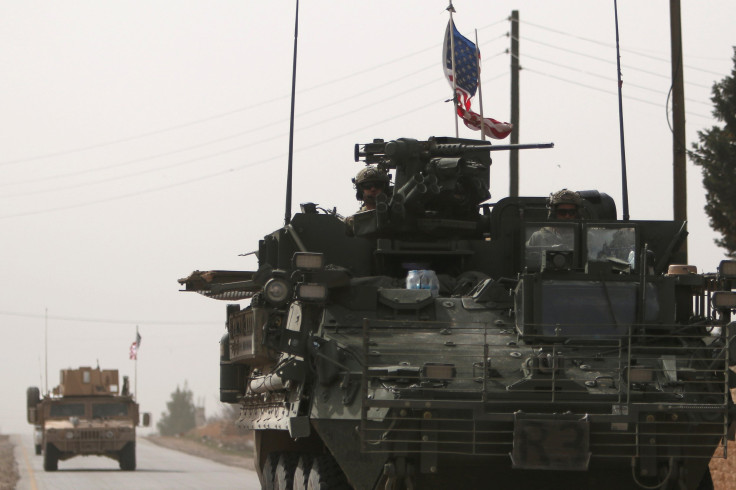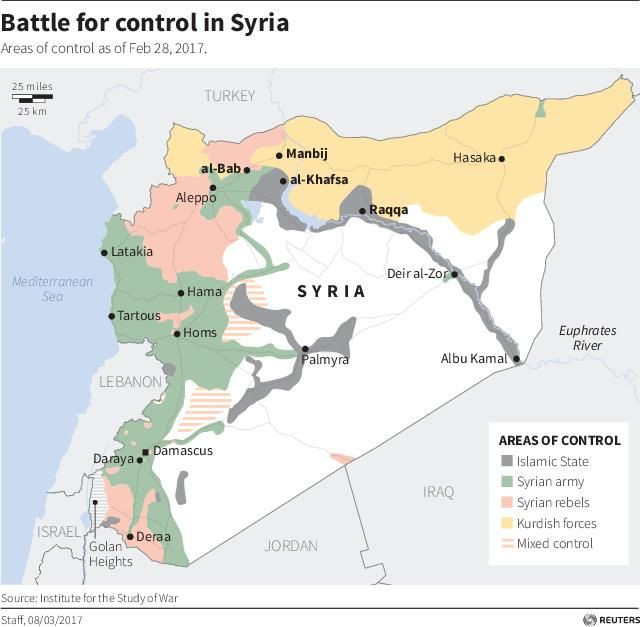US Military Power: Can Washington Defeat ISIS Before Russia, Turkey?

Syrian rebels have surrendered their last major pocket of influence in Syria's largest governorate of Homs to the Syrian government, the latest blow to the opposition's standing in the nation's six-year civil war that has a pitted a number of international and domestic forces against one another and against the Islamic State group, also known as ISIS.
Armed opposition forces were set to be evacuated in the coming weeks from the war-torn region taken by rebels during the early days of the conflict after mass anti-government protests in 2011 became a militant uprising against the government of Syrian President Bashar Assad. The U.S., Turkey and Gulf Arab nations such as Saudi Arabia and Qatar backed the rebels, while Russia, Iran and allied militias supported the Syrian government. Opposition forces enjoyed a number of early successes, but the rise of ultraconservative Sunni Muslim groups such as ISIS and al-Qaeda precipitated a decline in foreign support and a rise in vicious infighting. The focus of the war has since turned toward defeating ISIS and the U.S., Russia and Turkey have emerged as the primary international actors vying to oust the jihadists from their de facto headquarters of Raqqa.
Read: Did America Create ISIS? US Defends Against Turkish Accusations
The U.S., once one of the rebels' primary sponsors, gradually shifted its assistance to the Kurd-dominated Syrian Democratic Force (SDF). In August, Turkey launched a pro-Syrian opposition operation against ISIS and Kurds, including the SDF. Meanwhile, the Syrian army and its allies conducted a series of lighting advances last year, most notably taking Syria's second city of Aleppo, the last of the opposition's major population centers. The Syrian army also retook the ancient city of Palmyra earlier this month, posing for an assault on Raqqa. Nearby positions held by the SDF and Syrian rebels have also allowed provided a convenient path for taking the ISIS hub, however, a comprehensive strategy has not been established and violent rivalries have prevented any significant coordination between the groups.
Earlier this month, the Russia-backed Syrian army and U.S.-backed SDF formed an informal military alliance in the town of Manbij to prevent the entry of Turkey and its sponsored forces. Turkey has labeled Kurdish militants such as the People's Protection Units (YPG) as terrorists and has demanded they forfeit their positions. The U.S. and Russia have found themselves in the unlikely position of siding together against a mutual ally, Turkey, in defending SDF positions, some of which the group voluntarily ceded last week to the Syrian army.
Despite recent developments, the U.S. and Russia have not yet entered any formal military alliance and Assad has labeled the U.S.' presence illegal until Washington cooperated with Damascus and Moscow. The U.S. military has been described by experts as the most powerful in the world, with Russia coming in second. The number of U.S. forces deployed to Syria has been extremely limited, however, while Russia and Iran have been much more direct in their support of the Syrian army and allied militants such as those of the Lebanon-based Shiite Muslim movement Hezbollah, considered by some to be the most powerful paramilitary movement in the world. Turkey's rebels have advanced against ISIS, but have been marred by jihadist attacks within their own ranks.
Read: Is The Syrian War Over? Russia, US Team Up Against Turkey
"Talking about the future, I do not think that Turkey and the United States will be able to continue their dominance [in northern Syria]," Syrian defense analyst Omar Maaribuni told Russia's state-run news agency RIA Novosti Monday, saying the Syrian government was suspicious of Washington's endorsement of Kurdish aspirations for independence. "This is due to many factors, and the most important of them - the resistance, which can occur if the US and Turkish forces to refuse to leave the region after the war."
White House Secretary Sean Spicer reiterated at a press conference Monday earlier statements that the U.S. did not rule out working with Russia or any other country in combatting ISIS.

© Copyright IBTimes 2024. All rights reserved.






















